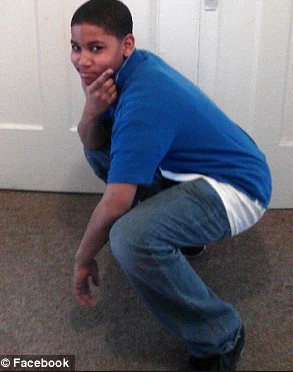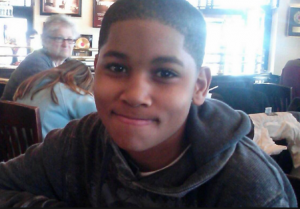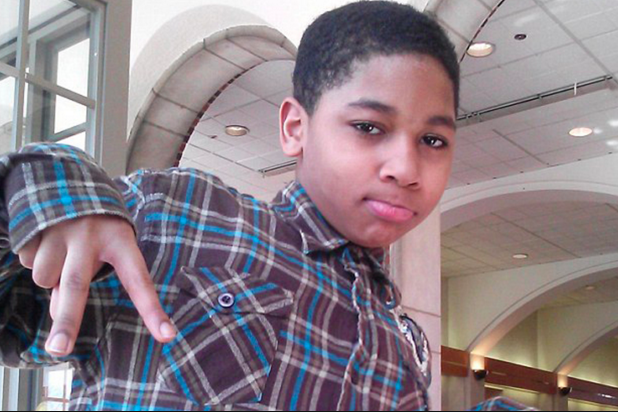 aNewDomain commentary — We’re not supposed to question juries. They’re our peers. They put in long hours, working hard essentially for free. Most of all, they see all the evidence. We don’t. We have to assume that they know what they’re doing.
aNewDomain commentary — We’re not supposed to question juries. They’re our peers. They put in long hours, working hard essentially for free. Most of all, they see all the evidence. We don’t. We have to assume that they know what they’re doing.
Sometimes, however, a jury verdict relies on so many false assumptions, baseless assignments of privilege and twisted logic that you have to call it out.
The decision of a Cleveland grand jury not to indict the cop who shot 12-year-old Tamir Rice to death is one such time.
Tamir Rice was playing outside his apartment building with a toy gun when a nosy neighbor took it upon himself to do the one thing you should never do in America unless you’re absolutely certain there is no other option: Call the police. Tamir, the caller told 911, was “probably a juvenile” and that the gun was “probably fake.”
According to Cleveland police, 911 dispatch didn’t relay that information to the two officers who responded, amped up and loaded for bear.
 Officer Timothy Loehmann blew Tamir away between 1.5 and 2.0 seconds after arriving at the scene.
Officer Timothy Loehmann blew Tamir away between 1.5 and 2.0 seconds after arriving at the scene.
Cuyahoga County prosecutor Tim McGinty called Tamir’s killing the result of a “perfect storm of human error, mistakes and miscommunications.”
Stuff happens. (Let’s hope the moron who called 911 is happy.)
I don’t need to have been a fly on the wall in the grand jury room to conclude they made a bad call.
First: What’s with this ridiculous assumption that, if a cop fears for his life, he is justified in instantly escalating the use of violent force to the nuclear option — firing his semiautomatic pistol into an American citizen?
McGinty, who made it abundantly clear he didn’t want anyone indicted, told a press conference that Loehmann feared for his life. So what if he did? Fearing for your life comes with the job, a job that requires common sense and sharp instincts to do well. Like, take a little time to assess a situation before speeding your cruiser up to a possible suspect and popping him faster than it takes to read half this sentence.
Second, whether or not the dispatcher passed on the info that Tamir was probably a kid with a probably fake gun is irrelevant. Who cares what a random nobody who calls 911 says?
There’s a phenomenon called “SWATting,” in which pranksters (often gamers) call 911 hoping that a heavily-armed paramilitary force descends on an address and freaks out the inhabitants, or perhaps kills them. Callers can understate a threat as well. What if Tamir Rice’s gun was real, and he wasn’t a kid, and dispatch had failed to forward that information along to the officers? Big duh here: Cops need to use their brains to figure out what, if anything, is actually happening at the scene when they respond.
Third, Cleveland’s ersatz prosecutors made an awful lot of their assertion that Tamir was “big for his age” and looked older than 12. This is important because, how many 12-year-old boys go on shooting sprees? It can happen. But’s it’s rare. After I read this Tamir the Giant argument, I looked at his recent photos and was puzzled. He looks exactly like a 12-year-old kid. On the bigger side, sure. But 12.
Why did Officer Loehmann think he was older?
Well, his highly abbreviated assessment time — about 1.75 seconds between screeching to a halt and unloading his service pistol — may have had something to do with it.
 Also, studies have shown that white cops tend to radically overguesstimate the age of black males. “Black 13-year-olds were miscategorized as adults by police officers (average age error 4.59 years),” according to The Washington Post. Yet another argument in favor of insisting that urban cops live in the communities that pay their salaries — they’ll learn what black kids look like.
Also, studies have shown that white cops tend to radically overguesstimate the age of black males. “Black 13-year-olds were miscategorized as adults by police officers (average age error 4.59 years),” according to The Washington Post. Yet another argument in favor of insisting that urban cops live in the communities that pay their salaries — they’ll learn what black kids look like.
Nothing can bring back Tamir. But we can learn from his murder. We can take back the assumptions that killed him and countless other young black men.
From The New York Times: ” ‘Even with indictments, juries will remain reluctant to convict police officers absent evidence of malice,” said Eugene O’Donnell, a former officer and prosecutor who now teaches at the John Jay College of Criminal Justice in New York. ‘Tremendous incompetence, the worst kind of training, disregard for people is really not enough,’ he said. ‘You’re going to have to go beyond that because the police are different.'”
Or we can decide that really, the police are not different. That cop lives do not matter more than civilian lives. That cops won’t enjoy the benefit of the doubt any more than the rest of us. That prosecutors will work just as hard to indict them as they do to indict someone of shooting a cop.
Cop privilege must die.
Which means no more acceptance of ridiculous excuses (“no one told me he was a kid”) for crazy behavior (shooting someone less than two seconds after sizing them up).
Congress is considering making it impossible for mentally ill people to buy guns. Until our cops become sane, they shouldn’t be trusted with weapons. (By the way, Officer Loehmann’s psychological profile indicates he wasn’t all there when Cleveland PD hired him.) Taking away sidearms and Tasers, given how well unarmed police forces work all over the world, is something the United States should seriously consider.
For aNewDomain, I’m Ted Rall.













